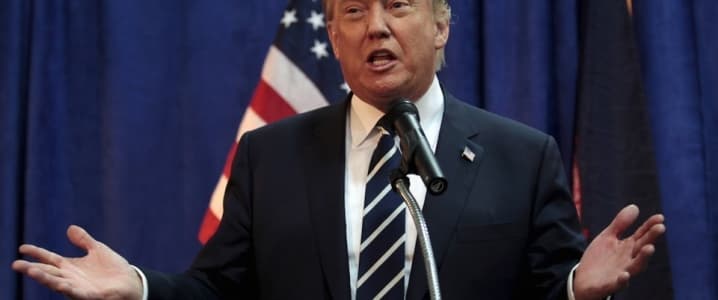While highly politically and economically charged behind-the-scenes OPEC talks are going on, the market and analysts are now factoring in another unknown that could come from outside OPEC and theoretically knock off 1 million barrels of Iran’s oil exports: President-elect Donald Trump’s comments from March of this year that his “number-one priority is to dismantle the disastrous deal with Iran”.
If Trump is able to dismantle the deal, which many contend is not possible given all the fingers in that particular pie, Iran’s crude oil exports would dive by around 1 million barrels per day - that’s roughly equal to the cut that OPEC might need to accommodate its production within the limits it had set almost two months ago, Julian Lee writes for Bloomberg.
And possibly, Saudi Arabia is secretly hoping that such a dismantling will take place, because while smaller OPEC members such as Algeria, Qatar and Venezuela are trying to get heavyweights Saudi Arabia, Iraq and Iran on the same page regarding output cuts, the cartel’s biggest producers are not even reading from the same book.
What’s more, the organization’s total production has been growing since it agreed to agree on output cuts, and now it has to strap on even deeper cuts if it is to make good on its promised production limit within the 33-million-bpd mark it set in September.
According to Lee, in theory Trump could rescind the Joint Comprehensive Plan of Action (JCPOA), that is, the nuclear deal between Iran and the U.S., the UK, China, France, Germany, and Russia. In the U.S., the deal went through via an executive order from President Obama, without being ratified by Congress, and Trump could rescind the order. Another way could be if one of the signatories were to bring its concerns over Iranian non-compliance up for a UN Security Council vote, which would be a vote to “continue the sanctions lifting”, as the wording of the accord goes, Lee says.
Although remote in theory, it’s possible that Iran may find itself with sanctions re-imposed. However, even if this speculative future were to come true, it would not be so until at least Trump’s inauguration on January 20 next year. Until then, OPEC has just two weeks to hammer out the details of proposed production cuts before the November 30 meeting in Vienna. The biggest and, at least for now, seemingly insurmountable rifts are among OPEC’s largest and most influential: Saudi Arabia, Iran and Iraq. Business as usual at OPEC. Related: Oil Prices Volatile Ahead of OPEC Meeting
Since the international sanctions were lifted in January of this year, Iran’s crude oil exports have risen by more than 1 million barrels a day, Bloomberg tanker tracking data shows. Iran is trying to ratchet its oil output and exports up to pre-sanction levels and claims that it deserves an exemption from cuts. Iran also insists that it would discuss freezing based on its self-reported figures for production, not OPEC’s secondary sources data. For October, Iran reported to OPEC that its output rose by 210,000 bpd to 3.92 million bpd, the biggest increase since sanctions were lifted.
Iran’s bitter regional rival and biggest OPEC producer, Saudi Arabia, however, has reportedly laid out its conditions for an output deal, and insists they freeze at some 3.7 million bpd based on the secondary sources OPEC figure.
The Saudis – who claim they have taken one for the team in cutting for far too long - now expect Iraq to cut its production and a collective action from OPEC members. But Iraq, like Iran, is claiming exemption on the grounds that it fights ISIS, and like Iran, it disagrees with OPEC data being used as reference to start freezing/cutting.
The Saudis also warned President-elect Trump that if he would deliver on his election promise to make America energy-independent and stop imports, he would hurt the U.S. economy. Related: Saudi Arabia And Russia To Meet Ahead Of OPEC Meeting
Economically speaking, Saudi Arabia may be more motivated than Iran in reaching an output deal, because low oil prices have hit its economy worse than Iran’s (which has been bumping up production and exports). However, politically speaking, it’s difficult to imagine that the Saudis would give Iranians leeway and allow Iraq to be exempted, and then make the most of the cuts themselves, again.
Iran and Iraq are raising production – even by OPEC secondary sources standards – in order to have the highest possible number if a deal is reached. Iran could also have the upcoming Trump presidency in mind, and could opt for a complete walkout of any agreement and pump as much as it can before America can eke out the word “sanctions”.
Several OPEC oil ministers are holding various meetings and talks this week in what would be one of the last possibilities to bridge positions before November 30.
But unless Saudi Arabia, Iran and Iraq start reading the same book, OPEC will not have a deal this year, again.
By Tsvetana Paraskova for Oilprice.com
More Top Reads From Oilprice.com:
- Saudi Arabia Issues Warning To Trump: Don’t Stop Saudi Oil Imports
- Low Oil Prices May Force An OPEC Deal
- Oil Guru Sees OPEC Dissolve If Deal Fails


















